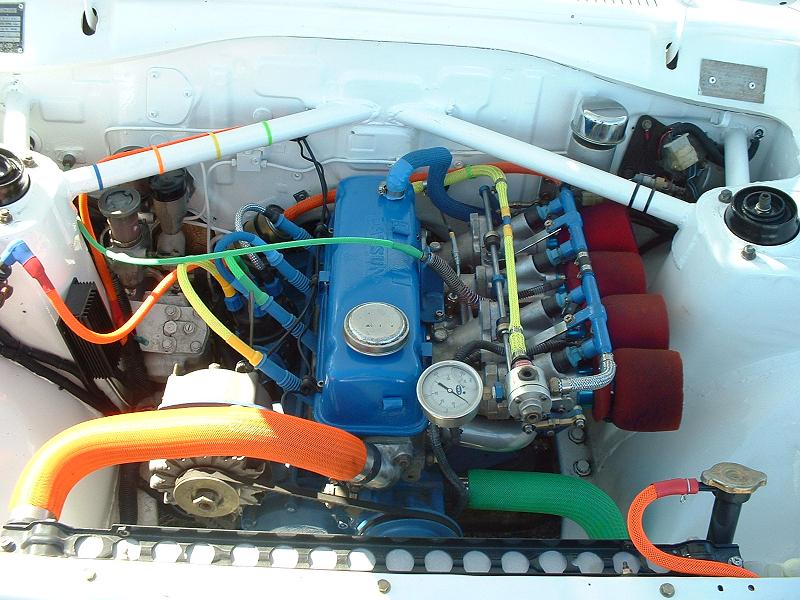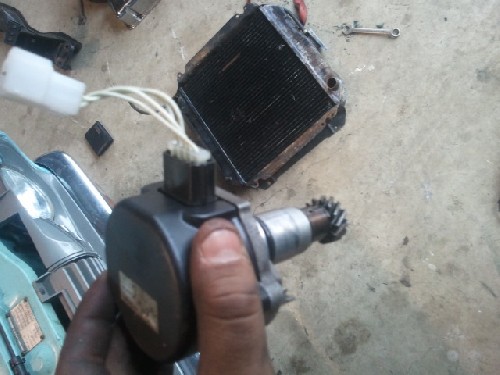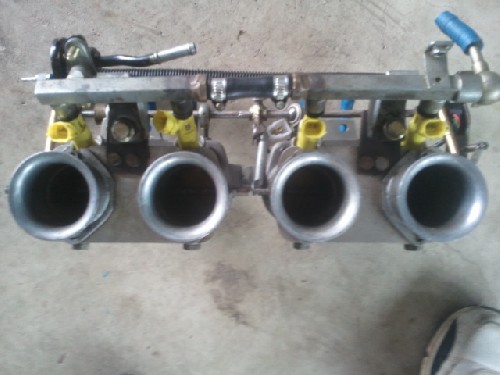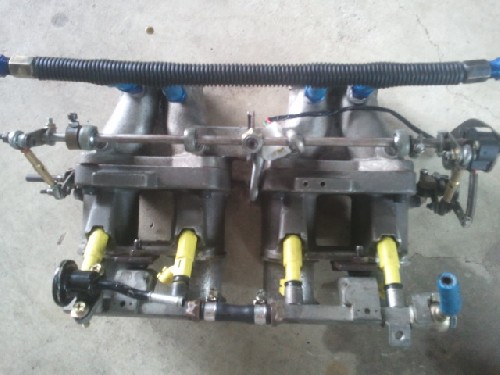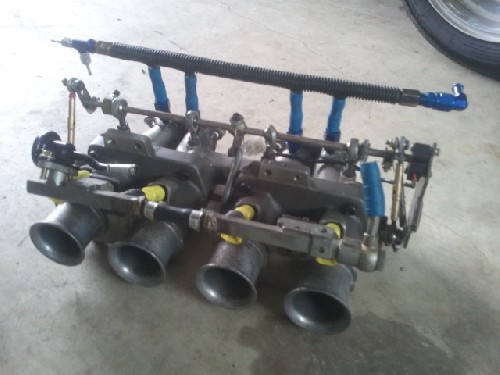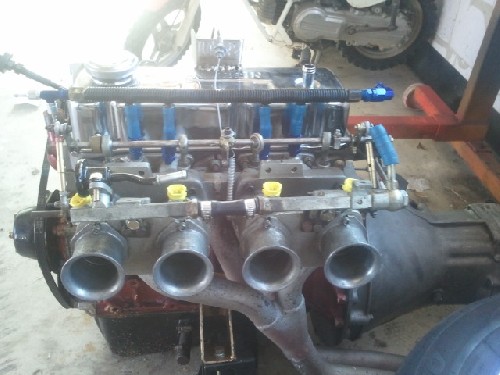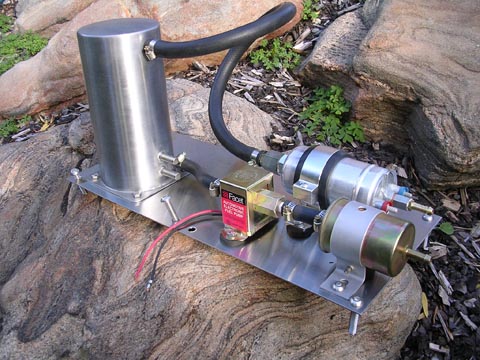Your Datsun 1200 can be converted to fuel injection. Benefits can include smoother, more powerful performance and better fuel economy.
Overview
Because Injection does not require a restricting venturi like a carburetor, the performance can be better. The highest-performing engines since the early 1940s have been fuel injected -- when the Germans perfected mechanical fuel injection. Top racecars have used injection since at least the early 1960s. Electronic fuel injection (EFI) has made it less expensive as fewer precision parts are needed, and more controllable by electronic circuits.
Also See: Budget EFI
A12 EFI
Photo: EFI HARDWARE - Victoria Australia
- Pro-race 4 Cylinder Throttle Body Injection Kit
- Surge Tank
- Facet lift pump
- Inline style EFI pump
- Hawk C12 engine management EFI controller (no longer available)
A VE-based ECU makes it possible to tune your engine, no dyno needed. These include Haltech, Adaptronic, or MegaSquirt 2.
Also needed:
- DCOE-style Intake Manifold e.g. Redline or Rowland, Mikuni or Tomei
- four fuel injectors
- Length of EFI-rated fuel hose (from Surge Tank to fuel rail)
- Length of regular fuel hose (from fuel rail back to Surge Tank)
- high-pressure Fuel Regulator
- Fused supply wire with relay for fuel pumps
The following are useful for tuning. If you choose to have a shop tune your engine, they are not needed
- $40 high-pressure fuel gauge
- Wideband Oxygen Sensor with controller
- Air Fuel Ratio Gauge
- laptop PC
NOT NEEDED:
- Special distributor. EFI works fine with stock unit
- Return line
- TPS not needed. MAP sensor is recommended instead
- Special camshaft not needed
- Air filters not needed, but are recommended for eng4ine longevity
1400 Kit
ITBs with Rowland M030 manifold
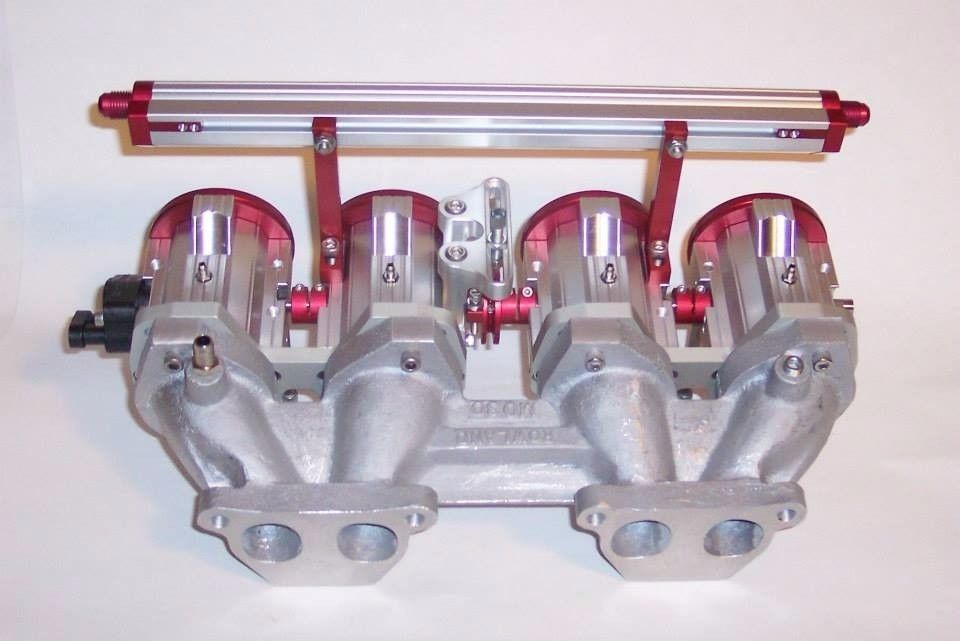
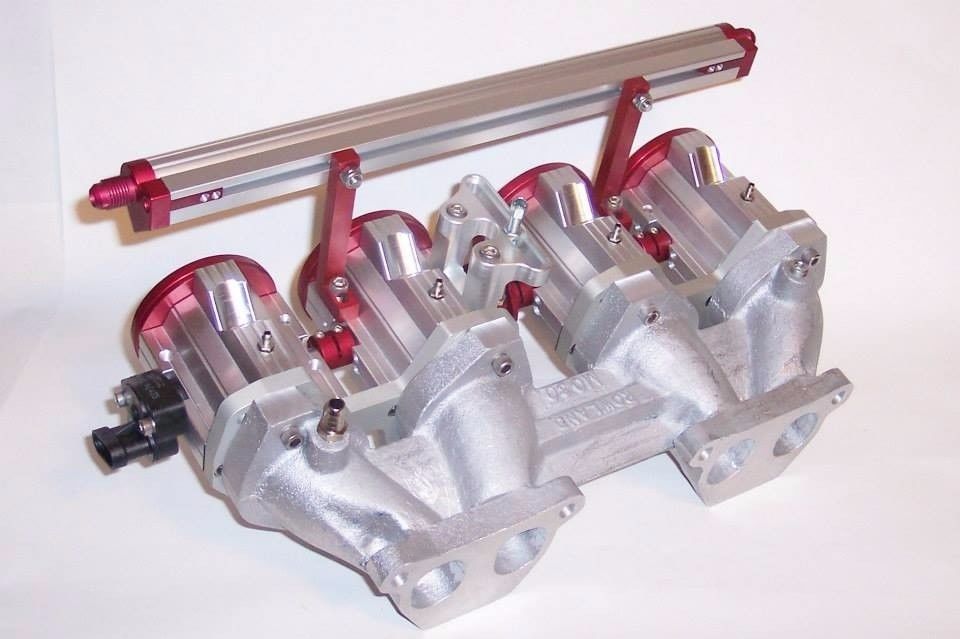
Mechanical Injection
Mechanical fuel injection has no computer and can also outperform carburetors. It is not as sophisticated as EFI, but can work just as well in drag racing scenarios. Since there is no computer and no electronics needed it is much simpler. However due to the precision required of the parts, it is generally just as expensive as EFI.
Here are some non-electronic systems that could be adapted to a Datsun motor:
- Bosch mechanical (K-Jetronic) from 1970s VWs and Audis (Bosch L-Jetronic was EFI)
- Hilborn constant-flow, favored by racers of all kinds
- Magoo
You'll need the whole package including high-pressure fuel pump, fuel distributor, injectors/throttle bodies and lines.
Electronic Fuel Injection
Why choose electronic fuel injection?
- Smoother
- More fuel efficient
- By design more HP than a carb due to no need for a restricting venturi (though some factory EFI still use a venturi)
- better fuel distribution, allowing for higher compression ratio and other tolerances
- for forced induction applications, automatic a/f control under boost
- Better air distribution
- automatically compensate for engine tuning changes. With a carb, you'd need to carefully plan out the design, and re-jet every time a component is replaced, for example, if you get a bigger exhaust pipe
With injection, a venturi is not needed. The venturi in a carb is a restriction that somewhat limits ultimate airflow. In the 1950s and 1960s, the fuelie Corvettes had the most power ... still true.
And, EFI is easier to work on than an emissions-controlled carb, generally speaking from 1st hand experience. I've rebuilt and jetted many carbs successfully, and tuned EFI systems of various sorts just as successfully. The tools and methods differ, but once you learn both, you'll probably agree with me. On the other hand, I hear the newest cars from the mid-90s up need specialized equipment. I have no experience with these newest systems, but can tell you that the late 80s EFI systems don't require special tools to work on.
Datsun Factory A-series EFI
Some 1980-1982 Datsuns in Asia markets came with an OEM (factory) EFI system. Nissan called it "EGI" -- Electronic Gasoline Injection. This is the "rare as" A14E Injection motor.
The A14E engine had quite a large horsepower difference:
- A14E: 92 PS @ 6400 rpm, 11.7 kg-m @ 3600 rpm
- A14: 80 PS @ 6000 rpm, 10.2 kg-m @ 3600 rpm
Other Choices
If you can find a complete Nissan EGI system for A-series engine, it is the easiest way to convert. It is a relatively straight-forward bolt on. However if you cannot find it, need higher performance, or have a far from stock engine, you'll want to look at other options.
Several choices here:
- Swap the entire engine assembly from a another Datsun into your 1200, like a CA18E or E15E
- Adapt an EFI system from another engine to the A-series engine. You can fit 200SX EFI, an OEM Nissan EFI system into other cars.
-
this set-up will run just about any 4 cylinder in the world ... And it's easier than you think. ;^)
- discussion: A15 EFI?? Using E-series setup on A-series engine.
-
A-series Conversion Kits
Purpose-made kits, including everything needed for an A-series engine, may be offered by some vendors.
See Main Article: $1200 EFI Turbo A12
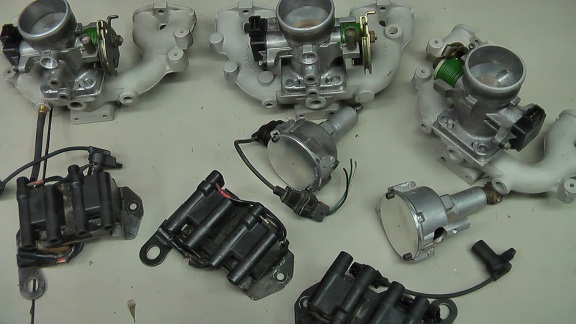
See Main Article: Spitronics EFI

See Main Article: Zenith EFI

Universal Conversion Kits
You can purchase "universal" 4-cylinder kits that use a carburetor manifold. These are sometimes call "ITB" (Individual Throttle Body) kits, although dual-throttle-body versions are even more common. Prices are about $500-$3500 -- not including manifold. Kits are available for:
- Weber DCOE single sidedraft manifold
- Weber DCOE dual sidedraft manifold
- Weber 32/36 downdraft plus an adapter plate for stock Datsun manifold
Generally, the kit won't include a hi-pressure fuel pump system, sensors, or ECU.
Twin Hitachi
- Datsun L Series 4-Cyl. Twin SU kit ($749) For L-series engine. Manifold not included. The throttle lever spacing varies between A-series and L-series manifold, but it may be adaptable
- Your own twin-Hitachi A12GX, A12T or A14T manifold (~$100 used)
- Add your choice of fuel supply, sensors, and ECU
SU-pattern Universal Throttle Body (use your own manifold)

Twin DCOE
- Extrudabody A14 Kit M-030 ($295 USD) Rowland DCOE twin-sidedraft manifold for oval-port A-series engine
- Twin Extrudabody Dual-DCOE kit ($1129 USD)
- Add your choice of fuel supply, sensors, and ECU

Single DCOE
Example $1400
- Your own Weber single-sidedraft manifold (~$100 used)
- Use the Extrudabody universal DCOE EFI kit ($580 USD with drilling)
- Add your choice of fuel supply (~$200)
- Add your choice of two injectors ($20 used, $70 new)
- Add your choice of sensors ($50 used)
- Add your choice of ECU ($200-up)
{{Photo!|Quad20DCOE-IDF20Kit20for20_biz20website.jpg}
Single Downdraft
This is a nice budget possibility. It has a bit of bling, plus you'll get better performance than stock and a nice smooth driving experience -- after careful tuning. Possibly even better fuel economy than stock, if you have the patience and attention to detail required to tune it right.
- Use your existing Datsun A-series manifold ($0)
- Custom fabricated adapter plate ($20 for aluminum stock)
- Plus your labor measuring, cutting, drilling and filing
- ITB: SU-Universal Throttle Body kit ($160) includes TPS sensor
- Air filter ($0 - $15)
- You can run without a filter. Extrudabody has a nice $15 unit.
- Add your choice of fuel supply ($80-$200)
- High pressure fuel hoses: ($20?)
- Run high pressure from anti-Surge Tank to the ITB, feed the tank with the regular fuel pump.
- Run a new low pressure hose to back of car for a fuel return line
- Hi-pressure fuel pump ($20-$75)
- $20 from wreckers, external pump
- $75 for in-tank pump, to put into anti-Surge Tank
- Surge Tank ($40-$100)
- High pressure fuel hoses: ($20?)
- Add your choice of two injectors ($20 used, $70 new)
- Add your choice of sensors ($20-$50 used)
- Get from the wreckers: GM air temp, water temp, oxygen, and MAP sensor
- Add your choice of ECU ($140-up)
- $140 for MegaSquirt-I solder kit with case
- Wiring ($0 - $20)
- Get wiring out of your parts car, or from the wreckers
- O2 sensor bung ($15-$50)
- Get a friend to weld it on for a can of VB
- Vacuum hose ($0)
- Surely you budget people have got some laying about
Total (estimated) $430-$1000, not including installation
Create Your Own Kit
Most Datsun1200.com users that have converted their A-series to EFI have designed their own kits, using a variety of parts. For example, using a factory EGI manifold with aftermarket ECU. Or universal Injector Bodies with HALtech ECU and GM sensors. Or fitting Ford TBI with Bosch injectors and a GM brain.
Nissan E15 parts on turbo'd A14 using Isuzu ECU

Ford CFI
A throttle body with inbuilt injectors using the Weber 32/36 carburetor bolt pattern was used by the Ford Falcon EA/EB. Using this on an A14 with Rowland 32/36 manifold will provide a high-flow induction system. Or it could be used on an A12 with a Weber adapter plate.
Falcon EA 1988-1991 with 3.2/3.9 liter L6 Falcon EB 1992-1993 with 3.9 base injection * power from 92-120 kw (120 to 161 hp)
Get all the parts from a donor Falcon, including wiring and sensors.
If you use MegaSquirt 2, you can customize the EFI for the small engine. Electronic Ignition is not required, it can use the points as a tach signal.
Worked great on an A15 making 115hp at the wheels with a Microtech ECU.
1. simplicity - original manifold can be used with weber adapter plate so it will fit under the bonnet looking original
2. CFI EA Falcons everywhere so inexpensive parts sourcing
3. Performance - The Falcon CFI is designed for a engine that produces 120-161 HP, so it's perfect for a hot A12 or a turbo A14
4. Ease of instalation - The Ford CFI computer runs on a Lambda and is self tuning...It gets its firing signal from the coil....(as far as researched similar to camira delco unit)
5. With a weber adaptor, the original air filter will still be able to be used...or a K&N for looks. (however will need modded bonnet bump)
The great thing about the EA Falcon CFI is that the pressure regulator is built onto the throttle body and it also only runs about half the fuel pressure of a normal EFI system so it's alot safer to toy with.
Ford CFI runs very smooth. It was a bit small for large-bore sixes and V8s so got a bad reputation, but is plenty big for a four-cylinder. Another problem was if a sensor went out it went into low-power limp-home mode. So check the ECU codes and replace any bad sensors and it will run top-notch.
Use a hot thermostat (180F or higher) as low temps will cause the computer to go into warming up mode.
Builds
Datsun Factory EGI

$1200 EFI
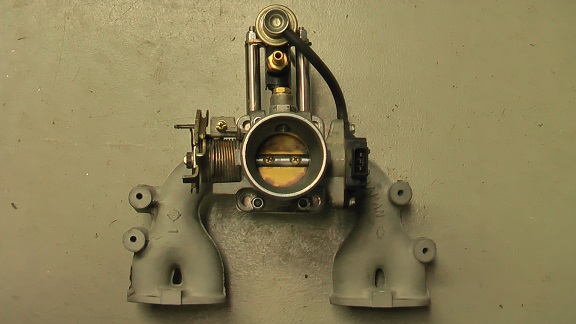
A12iR Project
POST A12iR Project (i=injection, R=supercharged)
GM sensors Forced Induction#AMR500 supercharger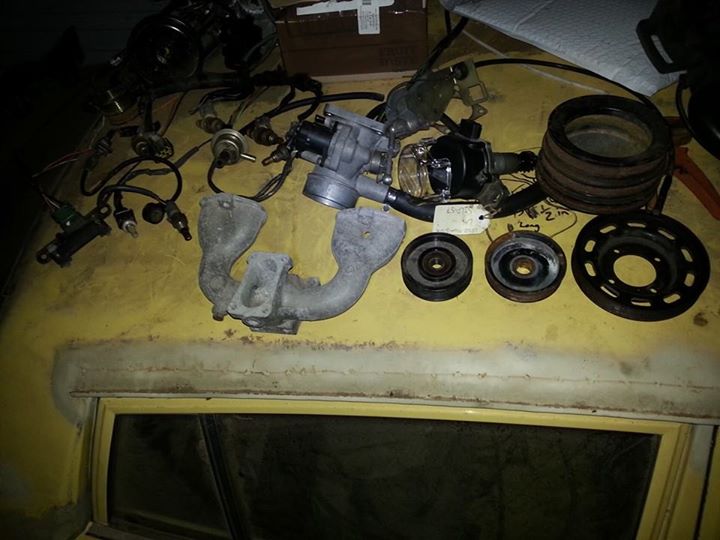
Hyundai EFI
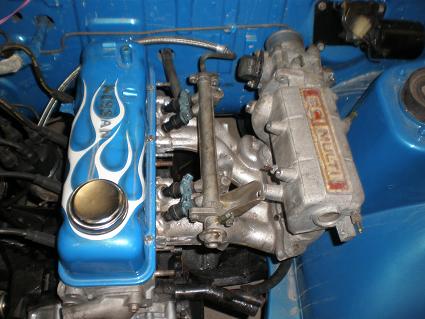
Datsun 200SX EFI

A15 Clubman
Jenvy DCOE kit cost $980 Wolf crank sensor on the front pulley Wolf V3 ECU A15 bored to 78mm, decked block Mazda flat top pistons polished rods & shot peened ARP rod bolts, balanced crank lightened flywheel, button clutch Ported head runs Avgas. 160Hp on webbers Clubman weighs 500kgs Lots of fun
A15 EFI
Wiring
See main article: EFI Wiring
What about spark control?
Along with your fuel injection system, you can use the stock A12 distributor -- no special spark control is required for EFI. However, to totally modernize your engine, you may install a Datsun electronic distributor, or use a distributorless crank-trigger multi-coil ignition system. The latter is called a "spark" system and can work with the EFI ECU, or with a standalone controller like MegaJolt.
See:
- Electronic Ignition for electronic distributors
- Crank Trigger for spark or for EFI
Weber DCOE Manifold Conversions
Got a Weber DCOE carburetor sidedraft manifold? Design your own system.
Replace the carbs with DCOE-replacement throttle bodies. These are a direct replacement for:
- Weber DCO/DCOE
- Mikuni PHH
- Solex ADDHE
- SK racing sidedraft
- Dellorto DHLA
Available in 40, 42, 45, 48, 50, and 55mm sizes from TWM
These take standard Bosch, Lucas, Rochester (GM) or Weber injectors.
Also available for downdraft IDF-style and IDA-style and DCNF-style manifolds.
suppliers:
- TWM
- speed-technology.com
- www.efihardware.com.au
- Injection Perfection quad throttle body bolts to a Weber manifold. reference: I wanna make injection
Speedway
Kinsler fuel injection on DCOE manifold

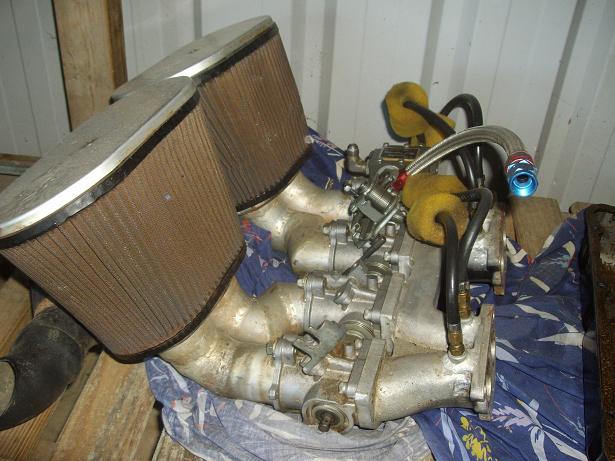
Custom
Custom Fuel Injection Setup made for oval port heads (A12GX, A14, A15).
Electronic Controller Units
The Electronic Controller Unit (ECU) -- aka ECU/brains/computer -- is critical to operation of the EFI system. You can use the factory stock ECU, or aftermarket ones, including MegaSuirt and General Motors.
See main article: ECU
Fanta injection
Fanta injection can be used with or without fuel injection. Search the main forum for more information. Texans prefer Nehi Grape as an anti-detonant.
Parts needed
* EFI Manifold, or other manifold sufficiently modified * Throttle body * Injectors and wiring harness * Fuel rail and lines * EFI-rated fuel hoese and clamps (17557-N4700, 16439-N4205)* Gas tank * Fuel pump, high pressure mounted in tank, or out of tank below level of fuel * Fuel filter * Fuel pressure regulator * (optional) Surge Tank * Return line * ECU (Electronic control unit)
Wiring:
- injector harness
- sensor harness
- power wiring and fuse
Sensors: one or more of the following:
- Throttle Position Sensor (TPS)
- Coolant temperature
- Oil temperature
- Intake air sensor
- Oxygen sensor
- MAP (Manifold absolute pressure -- vacuum sensor. Some can sense boost also)
Fuel Pump
The most elegant way to prepare to EFI fueling is to drop in a Fuel System like the Mad Dat underfloor kit.
Alternatively there are other ways to proceed.
Parts Needed: Fuel tank (either stock or fuel cell) Fuel pump, high pressure * mounted in tank, or externally below level of fuel Fuel filter Fuel pressure regulator (optional) Surge Tank (optional) Return line
EFI generally needs a high-pressure (~40 psi) fuel supply.
Fuel tanks from EFI cars are baffled to prevent pickup starvation on curves. Older cars don't have this. You can either: 1) keep the tank above 1/2 full, or 2) fit a "swirl pot" (anti-Surge Tank) up front with low pressure fuel pump supplying that.
Most older EFI fuel pumps are constant flow and need a return line. B210s and B310s have a return line already. B110s don't. EVAP B110 has a vent line which could be used as a return line, but then you would need to vent the tank somehow. Some guys empty the tank, and weld a new fitting to the tank and run a new return line up to the front. Or a return fitting can be Teed into the filler hose.
Newer EFI systems are constant-pressure, and are called return-less fuel injection. These began to be used in 1993 and by 2004 most cars were using them. If your ECU can handle return-less fuel, it simplifies the installation a bit as the return line and the vacuum-type regulator are not needed.
If fitting a newer Nissan EFI system, you can use the stock fuel pump with its associated damper. See 200SX EFI for more details.
Walbro 155 | Aeromotive 11104 | Bosch
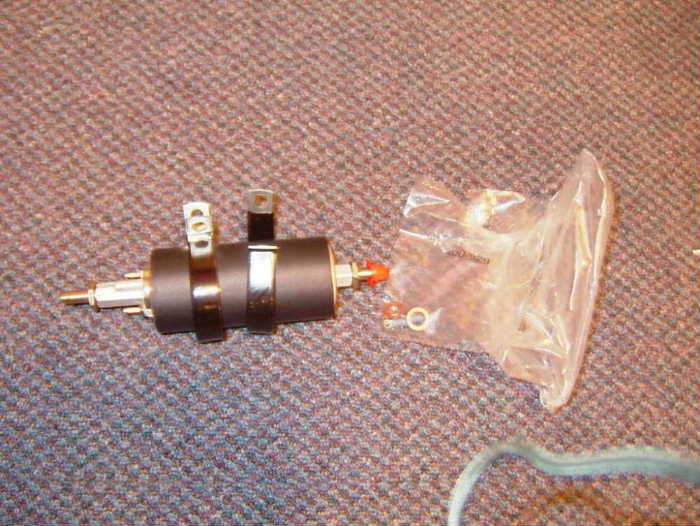
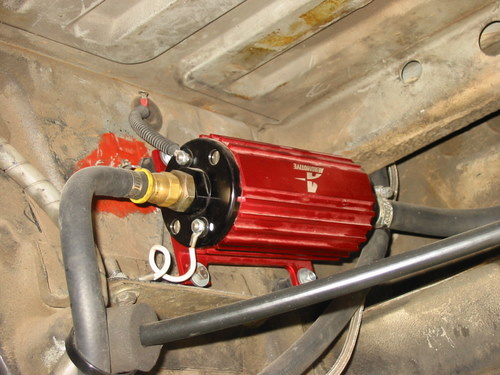

Injectors
See Main Article: Injectors
Used Parts
Yep. Injectors off many cars from the wreckers are perfect for you. Get the injector wiring plug too. For example Ford Mustang 5.0, Chevrolet V8, 4-cyl ECI Magna (the same as VN group A injectors)
Oxygen sensors may be sold very inexpensively by some wreckers. Supply and demand: not too many people buy used O2 sensors, keeping used prices low.
Manifolds
No special exhaust manifold is needed for EFI. But special inlet manifolds are available.
To convert your engine to EFI can obtain a factory EFI manifold or use the stock downdraft manifold with an EFI throttle body, buy a port-injection manifold, or make your own.
O2 Sensor Reading -- Air/Fuel Meter
O2 (oxygen) sensors can be used to troubleshoot the fuel/air mixture. This uses an Oxygen sensor (Lambda sensor) to display to you how the actual a/f ratio of the engine as it is running. This is good for carbureted cars too, so you can see which way you need to adjust or jet the carb.
See Main Article: Oxygen Sensor

![[Datsun 1200 encyclopedia]](/wiki/upload/wiki.png)




